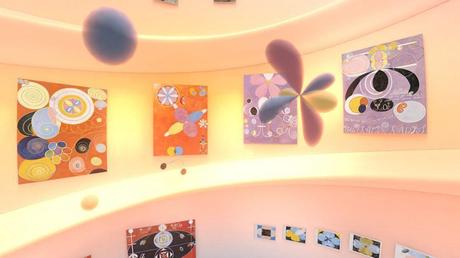
Drops from Nina Chanel Abney and Todd James have been included in the Gallery of Digital Assets (GODA), which was co-founded earlier this year by musician Pharrell Williams.
However, its recent NFT debut was mired in controversy because of objections from the artist’s heirs.
On Monday, GODA began an auction for tokenized digital recreations of works by Hilma af Klint, a Swedish abstract artist who achieved international renown in the 20th century. Together with Stolpe Publishing, the digital art platform Acute Art, and the Hilma Af Klint Foundation, GODA developed the “Paintings for the Temple” Ethereum NFTs.
Finally, 193 digital NFT recreations of af Klint’s artwork were created; one set was donated to the Foundation because it was considered “non-commercial.” This week, the GODA team sold off 163 NFTs from the other set and kept 30 for themselves. The NFTs were released at the same time as the definitive collection of the artist’s oeuvre, known as the catalog raisonné.
Although the official Foundation approved of the GODA sale, some of the artist’s surviving relatives have spoken out against the NFT’s premiere, despite the official Foundation’s approval. Hilma af Klint passed away in 1944.
Johan af Klint, the artist’s great-nephew, and Hedvig Ersman, the granddaughter of Erik Af Klint, Hilma Af Klint’s nephew, said in an interview with the art newspaper Hyperallergic this week that the NFTs were in opposition to the wishes of the artist. Ersman voiced his disapproval of the NFT transaction earlier this month.
“She saw these paintings as all part of one project. They were meant to be kept together,” Ersman told the publication. “They’re not meant for a person to have hanging on their wall in the living room. Now, with the NFT, they’re commercializing it, using Hilma af Klint’s name and reputation to subvert her message.”
The NFT in this case is a digital copy of the original artwork, and the token represents ownership of that object on the blockchain. In addition to virtual products and event tickets, NFTs are used for real-world items like profile pictures, virtual collectibles, and in-game currency.
The CEO of the Hilma af Klint Foundation, Jessica Höglund, recently informed the website Hyperallergic that the organization “is not in a position to either condone or condemn” reproductions of the artist’s work because it is in the public domain. However, she did mention that NFTs are part of the catalog raisonné the Foundation is working on in collaboration with Stolpe.
A statement made by GODA through the Foundation on Thursday before the auction’s close “[affirmed] that all required contracts and agreements are in place to certify the legality of the project.” Family members had “falsely” sought to represent the Foundation, according to a new statement from GODA provided to Decrypt.
“GODA was not made aware of any unhappy family [members] before they began to falsely represent the Foundation on Twitter,” the statement reads. “This was the first time we were aware of any concerns. We did a deal with Acute Art and Stolpe Publishing who brought this opportunity to us, as we are the most legitimate and credible art platform in the digital space.”
“Between our parties, we have a very sound legal agreement directly with the Foundation. From our understanding, this is a distant relative that has no involvement with the Foundation whatsoever,” the statement continues. “The Foundation has also made an official announcement clearing this up and detailing why the catalog raisonné, and by extension, the NFT project, is important for Hilma’s work.”
According to estimates, 163 items were sold in the GODA auction yesterday, with an average price of 1.5 ETH (a little over $1,800). According to the auction procedure, the ultimate price was set by the 163rd highest bidder.
As such, the highest 163 bidders paid an average of 1.5 ETH, and the overbid amount was deducted from the final purchase price. Members of the GODA Mint Pass NFT program also received a 15% pricing reduction. Today, the artwork was unveiled, giving buyers a glimpse at the unique piece they received in the drop.
It’s not the first time a famous artist’s family has voiced displeasure over a purportedly official NFT decline. When Pablo Picasso’s great-grandson, Florian, released NFTs based on his grandfather’s artwork, his relatives were understandably upset. In a short amount of time, the Picassos reconciled their differences.
Leave this field empty if you're human: